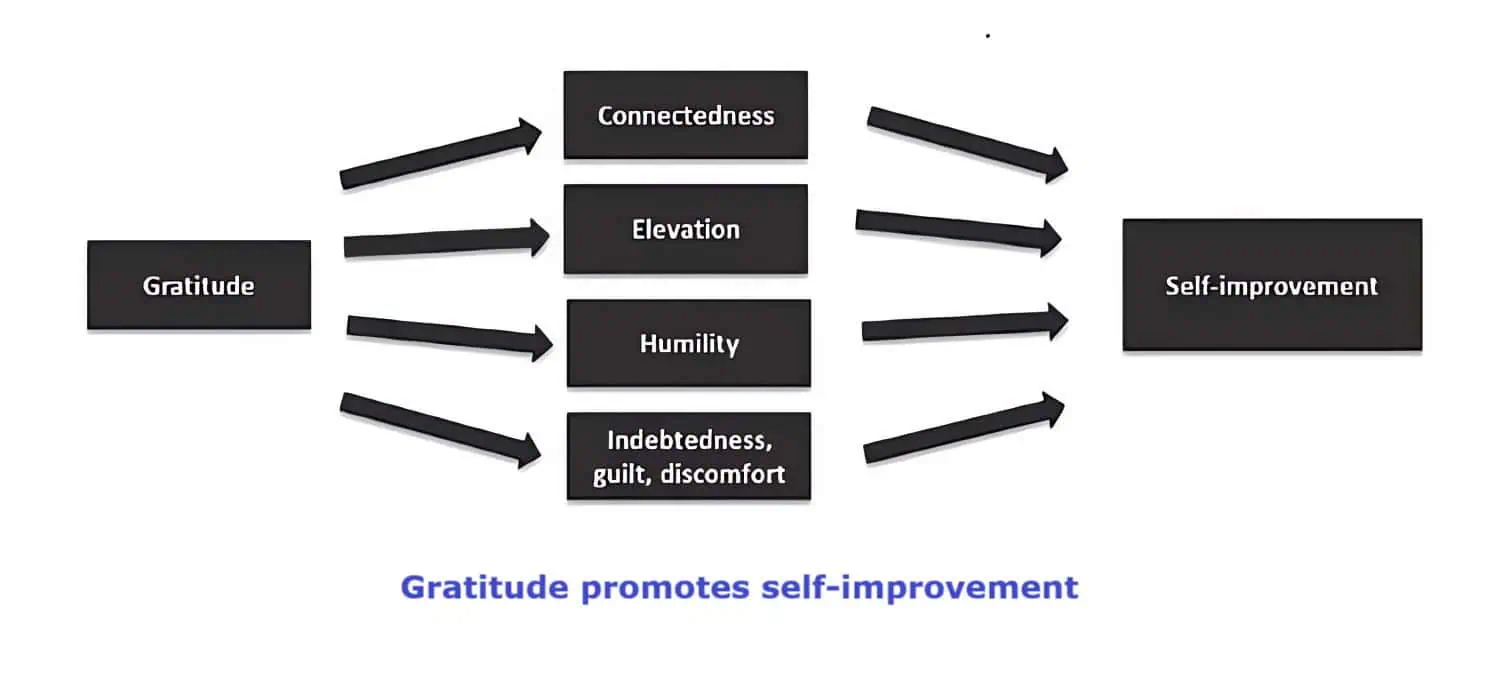Today's Friday • 7 mins read
— By Dr. Sandip Roy.
Is gratitude just saying “Thanks” or “I owe you one” to someone who did us a favor?
Actually, it’s more. Robert Emmons, the foremost authority on gratitude research, says gratitude needs us to fulfill two conditions:
- Affirmation: that we have achieved a positive outcome, and
- Recognition: that the good outcome came from a source outside ourselves.
So, being truly grateful means affirming the good in our lives and also recognizing the work of others in making it happen.
The word gratitude comes from the Latin gratia. Gratitude is among the most widely studied constructs in positive psychology.
But why is gratitude important?
Why Is Gratitude Important In Life?
Gratitude is important in life because:
- People who feel more gratitude tend to be more satisfied with their lives (Kerry, 2023).
- Gratitude can reduce negative affect and problematic functioning (Emmons & McCullough, 2003).
- Gratitude makes us more willing to recognize the kindness of others and help others, and improves our relationships (Algoe & Haidt, 2008).
Practicing gratitude shifts our focus to the good things in our lives, letting us realize that some of those good things came from others. And so, it is an essence of a positive mindset.
Gratitude is a highly regarded human value. Many cultures, religions, and spiritual traditions teach that gratitude costs nothing, but benefits both the giver and the receiver.

Gratitude is both a trait and a state (Boggiss & Consedine, 2020):
- As a trait or attitude, it is the tendency to notice and value the world in a positive light.
- As a mental state, it is having those moments when we feel thankful and appreciative.
The enemy of gratitude is the attitude of taking things and people for granted, which what the narcissists usually do.
Gratitude For Mental Health
- Gratitude can significantly reduce depression in young adults by increasing self-esteem and psychological well-being (Lin, Gratitude and depression in young adults, 2015).
- Gratitude buffers the effect of two self-harm risk factors: hopelessness and depressive symptoms. It can act as a barrier between suicidal ideas, hopelessness, and depression (Kleiman & Adams, Grateful individuals are not suicidal. 2013).
- Gratitude and grit work together to prevent self-harm by making life more meaningful. Those with high levels of gratitude and grit had the greatest reduction in suicidal ideation, with gratitude emerging as the more important factor in reducing suicidal thoughts (Kleiman, Adams, & Kashdan, Gratitude and grit indirectly reduce risk of suicidal ideations by enhancing meaning in life, 2013).
- Positive psychology researchers found that a single act of thoughtful gratitude resulted in an immediate 10% increase in happiness and a 35% reduction in depressive symptoms. The positive benefits faded within three to six months, showing that gratitude is an act that must be repeated often (Seligman, Steen, Park, & Peterson, Positive psychology progress: empirical validation of interventions, 2005).
Gratitude For Physical Health
- Gratitude can lower blood pressure (Jackowska & Brown, 2016) and help control blood sugar in diabetes patients (Schache & Hofman, 2019).
- Greater gratitude has been linked to better sleep, less fatigue, less negative mood, higher self-efficacy, and lower levels of inflammatory biomarkers in cardiac patients (Mills & Redwine, 2015).
- It can help control asthma symptoms (Cook & Woessner, 2018) and reduce workplace absence due to illness (Kaplan & Bradley-Geist, 2014).
- A gratitude practice can also increase your exercise frequency, thus helping you stay fit (Emmons & McCullough, 2003).
- It can improve your sleep quality and help you feel more refreshed in the morning (Jackowska, Brown, Ronaldson, & Steptoe, 2016).
- Grateful women who offered supportive care to others had lower levels of interleukin-6 (a body protein linked to chronic diseases of aging, like diabetes). It suggests that gratitude, via increased supportiveness, may improve immune function (Moieni, Irwin, & Haltom, 2019).
Gratitude And Happiness/Wellbeing
Gratitude not only allows us to have more positive emotions but also keeps the negative ones away. It helps us savor good experiences, handle adversity better, and build strong relationships.
Robert Emmons, the world’s leading gratitude researcher, says grateful people “reap emotional, physical, and interpersonal benefits.”
“Gratitude blocks toxic emotions, such as envy, resentment, regret and depression, which can destroy our happiness. It’s impossible to feel envious and grateful at the same time.”
— Robert Emmons, Leading Gratitude Researcher
Gratitude boosts our happiness in the present, past, and future.
- Gratitude for the past: recalling positive memories, feeling thankful for the things we received.
- Gratitude for the present: appreciating good things and good people present in our life today.
- Gratitude for the future: keeping an optimistic outlook and feeling thankful for a brighter future.
More From Gratitude Research: How Gratitude Is Good For Us
In a set of four studies, McCullough, Emmons, & Tsang found that gratitude is linked to feeling less negative and more positive emotions.
So, if you practice gratitude daily, you are more likely to feel happier, more alert, and more energetic. In addition, you will feel fewer strong negative emotions like resentment, bitterness, and greed.
- Feeling and expressing gratitude can boost your happiness and overall sense of well-being, as psychologists say (McCullough, Emmons, & Tsang, 2002).
- Gratitude has been judged as a motivating and energizing emotion (Emmons & Mishra, 2011).
- Gratitude lets people have more feelings of connectedness and greater perceived social support (Wood, Maltby, Gillett, Linley, & Joseph, 2008).
- Gratitude is linked with experiencing more daily positive emotions and fewer negative emotions (Kashdan, Uswatte, & Julian, 2006).
- Gratitude practice leads to a lowering of stress (Wood et al., 2008), and fewer depressive symptoms (Lambert, Fincham, & Stillman, 2012).
- Gratitude can cause people to believe that they deserve positive results for themselves and are capable of achieving them (Lambert, Graham, Fincham, & Stillman, 2009).
- Research finds that gratitude prompts people to make progress toward their goals (Emmons & Mishra, 2011).
- According to the find-remind-and-bind theory, gratitude causes people to recognize or acknowledge relationships with others, inspiring them to engage in behaviors that bring them closer together (Algoe, 2012).
- Psychologists confirm gratitude is a great way to increase our happiness, and better our mood, health, and relationships.
- Grateful contemplation can be used to enhance long-term well-being. Gratitude and Well-Being: Who Benefits the Most from a Gratitude Intervention? (Rash & Matsuba, 2011).
According to researchers at Eastern Washington University, the grateful people have these four characteristics:
- Feel a sense of abundance in their lives
- Recognize and enjoy life’s small pleasures
- Appreciate the contributions of others to their well-being
- Acknowledge the importance of experiencing and expressing gratitude
Generally grateful people also report being less narcissistic.
FAQs
How many types of gratitude are there?
1. Benefit-triggered gratitude: felt as a response to an action by another person (“I am grateful that my friend helped me out of this difficult situation.”)
2. General gratitude: an overall appreciation or thankfulness for important and meaningful things in one’s life (“I am grateful for my family.”)
How does gratitude differ from indebtedness?
• An indebted person feels obligated to repay the help they received, while a grateful person doesn’t feel any obligation to repay.
• Indebtedness can cause the receiver to avoid the giver, whereas gratitude can encourage the receiver to seek out to strengthen their bond with their benefactor.
Final Words
Did you know that women feel more grateful than men?
In a study where people tried different gratitude exercises over 14 days, women showed stronger feelings like being appreciative and thankful. They also felt more positive overall compared to men (Mishra & Emmons, 2009).
Try this gratitude exercise:
“Think of someone in your life who you feel like you have never fully or properly thanked for something meaningful or important that they did for you. Thank them in your mind now.”
• • •
√ Also Read: 5 Timely Ways To Practice Gratitude In Life
√ Please share it with someone if you found this helpful.
» You deserve happiness! Choosing therapy could be your best decision.
...
• Disclosure: Buying via our links earns us a small commission.
